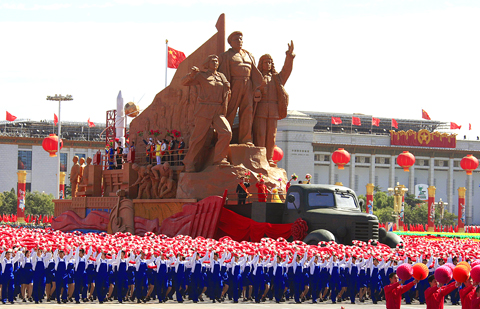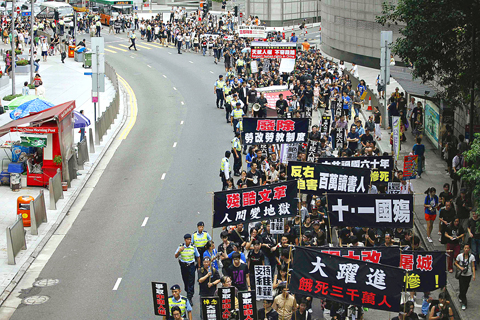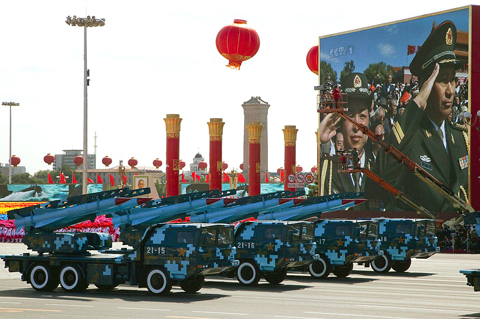China celebrated its wealth and rising might with a show of goose-stepping troops, gaudy floats and nuclear-capable missiles in Beijing yesterday, 60 years after Mao Zedong (毛澤東) proclaimed its embrace of communism.
Tiananmen Square became a high-tech stage to celebrate the birth of the People’s Republic of China (PRC) on Oct. 1, 1949, with the Chinese Communist Party (CCP) leadership and guests watching a meticulously disciplined show of national confidence.
Celebrations began in the morning with troops firing cannons and raising the red national flag while President Hu Jintao (胡錦濤), wearing a slate grey “Mao” suit, looked on from the Gate of Heavenly Peace.

PHOTO: REUTERS
Hu descended to Beijing’s main thoroughfare and inspected rows of troops, riding past them in a black limousine and bellowing repeatedly, “Hello comrades, hard-working comrades!”
“From here it was that Chairman Mao solemnly announced the founding of the People’s Republic of China, and from then the Chinese people stood up,” Hu told the guests and troops. “Today a socialist China embracing modernization, embracing the world and embracing the future stands lofty and firm.”
The two-hour parade of 8,000 soldiers, tanks and missiles, 60 elaborate floats and 100,000 well-drilled civilians was a proud moment for many Chinese, watching the spectacle across the country on TV. Tiananmen Square was lit up last night with a huge fireworks display.

PHOTO: REUTERS
The government also wanted the day of extraordinary spectacle and security to make the case that its formula of strict one-party control and rapid growth remains the right one for hauling the world’s third-biggest economy into prosperity.
The soldiers goose-stepping past at exactly 116 steps a minute carried the theme that the CCP knows how to run a show — and the country.
“The parade is reminiscent of the old Soviet-era May Day parades that bristled with the latest missiles and served as a warning to the US,” said Wendell Minnick, Asia bureau chief of Defense News.

PHOTO: EPA
“For many in the US who watch the Chinese military, this is a real intelligence bonanza. Many of the weapons, particularly missiles, have not been seen by the public before. US intelligence analysts will go nuts over the photos,” he said.
“Of particular concern for the US and Japan was the display of the new road-mobile Dong Feng-31 intercontinental ballistic missile [ICBM],” Minnick said.
“China is clearly signaling to the US it has a nuclear strike capability that can hit Washington. Prior silo-based ICBMs such as the aging DF-5 were unreliable and easy for the US to target. But the new road-mobile ICBMs China is producing will be very difficult to locate during a war,” he said.
Short-range Dong Feng 11 and 15 were also displayed, he said, noting that these kinds of missiles were used during the Taiwan missile crisis of 1996.
“The parade is a clear signal to Taiwan. The variety and quality of new arms on display has to be intimidating to Taiwan military officials. China is basically saying to Taiwan independence advocates, ‘forget it, you’re going to lose.’”
But even as the displays celebrated the PRC, security cordons prevented residents from seeing the parade, with central Beijing emptied of all passers-by.
“It’s not really for us ordinary people, is it?” said Wang Chenggong, a migrant worker from Henan Province trying to watch a TV near a crowded streetside stall.
Residents on the parade route were banned from peeking out their windows.
“Go home! Leave now! Go watch TV at home!” a policeman yelled through a bullhorn at a crowd gathering kilometers from the square.
After the military parade, floats lauding China’s history, achievements and regions passed by.
They included a farm produce float with two model cows, one showing China’s space program with a lunar orbiter and an Olympic Games display with a model of the Bird’s Nest stadium.

AGING: As of last month, people aged 65 or older accounted for 20.06 percent of the total population and the number of couples who got married fell by 18,685 from 2024 Taiwan has surpassed South Korea as the country least willing to have children, with an annual crude birthrate of 4.62 per 1,000 people, Ministry of the Interior data showed yesterday. The nation was previously ranked the second-lowest country in terms of total fertility rate, or the average number of children a woman has in her lifetime. However, South Korea’s fertility rate began to recover from 2023, with total fertility rate rising from 0.72 and estimated to reach 0.82 to 0.85 by last year, and the crude birthrate projected at 6.7 per 1,000 people. Japan’s crude birthrate was projected to fall below six,

US President Donald Trump in an interview with the New York Times published on Thursday said that “it’s up to” Chinese President Xi Jinping (習近平) what China does on Taiwan, but that he would be “very unhappy” with a change in the “status quo.” “He [Xi] considers it to be a part of China, and that’s up to him what he’s going to be doing, but I’ve expressed to him that I would be very unhappy if he did that, and I don’t think he’ll do that. I hope he doesn’t do that,” Trump said. Trump made the comments in the context

SELF-DEFENSE: Tokyo has accelerated its spending goal and its defense minister said the nation needs to discuss whether it should develop nuclear-powered submarines China is ramping up objections to what it sees as Japan’s desire to acquire nuclear weapons, despite Tokyo’s longstanding renunciation of such arms, deepening another fissure in the two neighbors’ increasingly tense ties. In what appears to be a concerted effort, China’s foreign and defense ministries issued statements on Thursday condemning alleged remilitarism efforts by Tokyo. The remarks came as two of the country’s top think tanks jointly issued a 29-page report framing actions by “right-wing forces” in Japan as posing a “serious threat” to world peace. While that report did not define “right-wing forces,” the Chinese Ministry of Foreign Affairs was

PREPAREDNESS: Given the difficulty of importing ammunition during wartime, the Ministry of National Defense said it would prioritize ‘coproduction’ partnerships A newly formed unit of the Marine Corps tasked with land-based security operations has recently replaced its aging, domestically produced rifles with more advanced, US-made M4A1 rifles, a source said yesterday. The unnamed source familiar with the matter said the First Security Battalion of the Marine Corps’ Air Defense and Base Guard Group has replaced its older T65K2 rifles, which have been in service since the late 1980s, with the newly received M4A1s. The source did not say exactly when the upgrade took place or how many M4A1s were issued to the battalion. The confirmation came after Chinese-language media reported